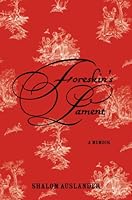 Cover of Foreskin's Lament: A Memoir
Cover of Foreskin's Lament: A Memoir
“I know it doesn’t make sense. I know I shouldn’t believe it. I know, and I know, and I know, but I just can’t seem to get this Character out of my head. I’ve tried to forget, I’ve tried to reframe Him, to rewrite Him, to move on. I read Sam Harris. I read Richard Dawkins. It all makes sense, but none of it helps. Maybe I am beyond help”.
This really is the crux of book. One man’s battle with the ultraconservative religious conditioning he received growing up as an Orthodox Jew in Spring Valley, New York. However, don’t expect a complete overt ridiculing of religion - although it is far from respectful – this is a battle that is set to end one way: in negotiations.
This is a continuation of the theme Auslander began in his debut book, “Beware of God” and uses the same very humorous commentary style. It is this particular style that makes the whole book reads more like a therapy session than a biographical work with the author shifting between the impending birth of his first child and his experiences growing up in Spring Valley; his time spent studying in Israel, his work as a “shomer” (a watcher of dead bodies) and his eventual casting out of his community. There are plenty of times when you read the work tongue-in-cheek; wondering if this is really the work of an atheist putting across an irreverently satirical idea. The repression and hypocrisies of his family juxtaposed with their holier than thou veneers comes across as classic irreligious farce. It is arguable that Auslander uses God as a disguised metaphor for the very nature of his family and his particular community.
However, Auslander’s discussions, particularly with his wife, Orli, who regularly remarks “They really did a number on you”, are very convincing. You genuinely feel for the idea of a person fighting against his early programming through over devotion then rebellion, a return to devotion and finally an acceptance of a type compromise outside his cultural group.
“Foreskin’s Lament” is very amusing from start to finish - full of quotable lines that would move even the staunchest theologian – and despite the word “irreverent” popping up in the majority of reviews I did not find any intentional malice directed at anyone, not even God.
Don't forget to check out Jamie Clubb's main blog www.jamieclubb.blogspot.com
![Reblog this post [with Zemanta]](http://img.zemanta.com/reblog_e.png?x-id=da2ac3d8-0238-4f7d-b552-224c5d97c77b)